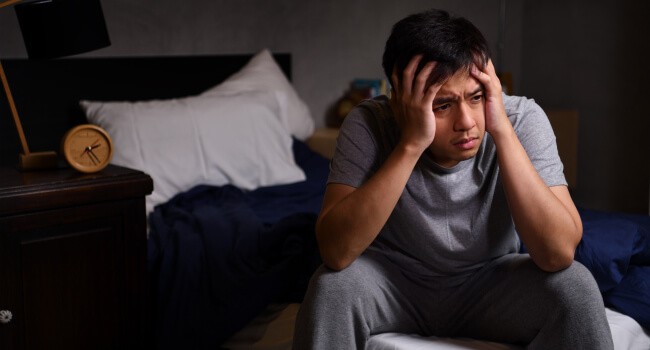Highlights
- Sleep inertia is the groggy, disoriented state you may feel right after waking up, especially from deep sleep.
- Biological and environmental factors — including blood flow, delta waves, and irregular sleep patterns — can make it worse.
- It’s usually short-lived, but persistent sleep inertia can be improved with better sleep habits or professional treatment, including medication.
You’ve probably had the experience of waking up from a deep nap and feeling groggy or disoriented. You may have even needed to take a few moments to get your bearings. If someone talked to you, you may not have been able to understand what they were saying. This common experience is called sleep inertia.
Sleep inertia isn’t a mental health condition or sleep disorder on its own. But some people experience it to an extreme level, to the point where it can affect their functioning and job performance. Let’s learn more about its symptoms and causes, as well as how to overcome sleep inertia.
What Is Sleep Inertia?
Most people feel a little groggy or tired when they first wake up in the morning, especially from deep sleep. But sleep inertia is more serious because it actually slows down your cognitive functioning. You might feel confused about where you are or take longer than usual to fully wake up. It’s also possible to experience slower reaction times and problems with memory and learning.
Sleep inertia isn’t a mental health condition on its own — it’s a common, temporary experience that many people face when they wake up (especially when they haven’t rested well). But some people experience it for longer, which can make it hard to function.
How Long Does Sleep Inertia Last?
Sleep inertia usually lasts between 15 and 60 minutes, but some people experience it for up to 2 hours. Being sleep-deprived can make it more likely that you experience sleep inertia for a longer time after waking up.
Sleep Inertia Symptoms
You can experience sleep inertia any time you wake up — in the morning, after a nap, or during the night. Some of the signs and symptoms of sleep inertia include:
- Grogginess: You feel heavy and sluggish, like your brain and body haven’t caught up to being awake yet.
- Delayed Reaction Times: You feel like you can’t think as quickly, take longer to react to the world around you, and can’t get rid of this groggy feeling quickly.
- Poorer Short-Term Memory: Even when someone is talking to you, you can’t seem to retain the information.
- Confusion or Disorientation: You might take some time to reorient yourself to your surroundings; it might even feel like you’re still in a dream.
If your sleepiness drags on throughout the day, then you may be diagnosed with idiopathic hypersomnia, or excessive daytime sleepiness. But sleep inertia is temporary and only lasts for half an hour or so after waking up.
What Causes Sleep Inertia?
Researchers haven’t identified the specific cause of sleep inertia. Some experts have hypothesized that it could be a protective mechanism to keep you drowsy, for example, in case you woke up unintentionally and want to go back to sleep.
Despite a lack of a definite cause, research has shown that there are certain factors that can increase your risk of experiencing sleep inertia. Many of them are neuropsychological or biological, but some environmental factors can play a role as well.
Biological Factors
- Blood Flow: When you sleep, blood flow in the brain slows down. It increases again after waking, but if that process is delayed, it can leave you feeling morning grogginess because your brain hasn’t yet reached its usual level of alertness.
- Brain Waves:
Delta waves[2] — the slow brain waves linked with deep, restorative sleep — also play a role. If you wake up before your brain has reduced its delta wave activity, you may feel disoriented and sluggish. - Prefrontal Cortex: Another factor is
how quickly your brain “reactivates” after waking[3] . Studies show that in sleep-deprived people, the prefrontal cortex — which helps with decision-making, self-control, and planning — can take longer than other regions to regain full blood flow. This delay can make it harder to think clearly. - Adenosine: A final factor is
adenosine[4] , a chemical that builds up in your brain while you’re awake and makes you feel tired. Normally, adenosine levels drop while you sleep. But if you wake up suddenly, it may still linger, which can keep your brain in a state of drowsiness.
Environmental Factors
- Shift Work: People who do shift work, like nurses, may be more likely to experience sleep inertia — usually because of chronic circadian rhythm disruption. You might find some time to take short naps during your breaks, but experience sleep inertia when you wake up. This can seriously get in the way of your work and can even be dangerous.
- Irregular Sleep Schedule: Even if you’re not a night shift worker, your circadian rhythm could be disrupted if you have an irregular sleep schedule. This can make you more likely to experience sleep inertia.
- Sleep Deprivation:
Research shows[1] that people who are sleep-deprived are more likely to experience stronger sleep inertia. In one study, people who took a nap after being awake for 64 hours were much more likely to experience sleep inertia than those who had only been awake for 16 hours. - Alcohol and Other Substances: Certain medications — like antihistamines, benzodiazepines, and opioids (typically, medications that cause drowsiness) — can increase your risk of sleep inertia. Drinking alcohol can also make sleep inertia worse.

Effects and Risks of Sleep Inertia
The cognitive effects of sleep inertia are even worse than those of sleep deprivation. In
Experiencing sleep inertia sometimes, especially when you’re at home, isn’t usually a problem. But it can become dangerous in certain situations. People who need to take naps at work — like nurses, pilots, firefighters, and so on — are especially vulnerable to the risks.
For example, take a night nurse who wakes up from a short nap between rounds. When they’re called to respond to a patient emergency, it might take several minutes to fully regain focus — time that can make a real difference in a critical setting. Or someone who operates heavy machinery after a nap may not react quickly enough to avoid an accident. In these cases, the lingering effects of sleep inertia can pose real safety risks.
How to Reduce or Prevent Sleep Inertia
Sleep inertia usually fades as your brain wakes up, but you can shorten that transition with consistent habits.
- Wake Up Gradually: Give yourself a few minutes before jumping into activity. Stretch, sit up slowly, or take deep breaths to help your body and brain adjust.
- Keep a Regular Sleep Schedule: Going to bed and waking up around the same time every day keeps your circadian rhythm steady, which makes it easier to wake up clear-headed.
- Adopt a Healthy Bedtime Routine: Avoid caffeine, alcohol, and heavy meals before bed. Turn off screens, dim lights, and create a calm, cool sleeping environment.
- Get Enough Sleep: Consistently sleeping less than your body needs increases the risk of sleep inertia. Try to get seven to nine hours a night when possible.
- Exercise Regularly: Physical activity improves blood flow and brain function, which helps you feel more alert when you wake up. It also helps you sleep more soundly at night.
- Practice Quick Countermeasures After Waking: If you have trouble waking up in the morning or after a nap, splash cold water on your face, turn on bright lights, or do something mildly stimulating — like light stretching or listening to upbeat music. These small actions help the brain “switch on.”
- Try Caffeine After Waking Up: Caffeine blocks adenosine, the chemical that causes sleepiness, and can help you feel more awake. Just avoid drinking it too late in the day, as it can interfere with nighttime sleep.

When to Seek Professional Help
t’s normal to experience sleep inertia sometimes, especially when you’re sleep-deprived or you’ve been drinking. But if you experience it all the time, or if it’s getting in the way of your performance at work, then you may benefit from professional support.
When better sleep hygiene doesn’t bring the expected results, sleep inertia can be treated through medications that promote wakefulness. Examples include:
- Caffeine
- Stimulant medications, like those used for attention-deficit hyperactivity disorder (ADHD)
- Modafinil, which is a stimulant used for sleep disorders
When sleep inertia is related to another sleep disorder — like insomnia — then it’s important to treat that underlying condition. You can consult a medical provider online to discuss your symptoms and get support — clinicians at MEDvidi are here to conduct an assessment, help identify underlying causes, and recommend treatment for sleep issues.
Takeaway: Get Support for Sleep Inertia with MEDvidi
Sleep inertia can make mornings feel frustrating and disorienting. Often waking up grumpy and not feeling rested after sleep is a common sign that your sleep quality needs attention. Even though the exact cause isn’t fully understood, a healthcare professional can help you identify what’s contributing to it and help you take steps to address it.
The good news is that sleep inertia is usually temporary and manageable with the right treatment. If it’s affecting your daily life, reach out to a MEDvidi clinician. They can help you improve your sleep habits, explore treatment options, and create a personalized plan so you can wake up clear-headed and ready to take on the day.
FAQs
Is sleep inertia normal?
Can sleep inertia last all day?
What does sleep inertia feel like?
Can sleep inertia be cured?
Does sleep inertia get worse as you get older?
It can, since sleep quality and circadian rhythms
Is sleep inertia a symptom of ADHD?
It’s not a direct symptom of ADHD. But many people with ADHD
What hormone causes sleep inertia?
Can sleep inertia make you sick?
Is sleep inertia a symptom of depression?
Can sleep inertia be painful?
What is the best medication for sleep inertia?
Caffeine or prescription wakefulness-promoting medications (like modafinil or ADHD stimulants) may be helpful when lifestyle changes aren’t enough. However, if sleep inertia is caused by conditions such as insomnia, depression, or anxiety, the medication is chosen depending on the diagnosis.












